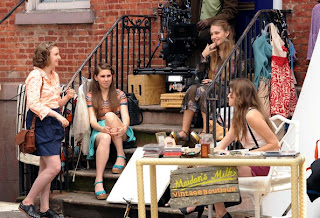I've finally seen every episode of HBO's new series Girls. The first couple episodes were very charming and I found myself hooked. As someone who is in a similar situation as the protagonist, Hannah, I felt that the depiction of a struggling writer facing her terrifyingly bleak future was pretty accurate: the way she stuffed her face with a dinner her parents bought her in the shot that opened the series as well as her reasoning behind the illustrations tattooed on her shoulder were such genuine, humanizing depictions of the artist as a young woman. I'll admit it, I was charmed by Lena Dunham's witty creation.
 |
| Girls Starring: Lena Dunham, Allison Williams, Adam Driver Created by Lena Dunham My Opinion: Sassy and modern, but in danger of growing stale |
Furthermore, the first couple episodes displayed the graphic sex and lack of censorship for which HBO has always been known. However, I began to notice a trend in the intimate scenes. Hannah frequently noted that she came close to having an orgasm but never actually did, Marnie tried to have sex with Charlie only to get him back and stopped half way through and Jessa was seen having sex with a man purely to exert her power over him. Despite the sometimes darker ironic comedy in the show, this pattern revealed something more dismal than the abortion waiting room party- Girls don't have sex for themselves.
While this may be an accurate comment on the lives of some girls, I know for a fact that women enjoy sexual pleasure and to fail to indulge that fact is rather old fashioned. Jessa seems to discuss her sexual escapades enough, but why don't we see it? Furthermore, as the series draws on, most of the sex leaves the screen. I'm not saying I'm disappointed that it didn't turn into a porno, but these are the lives of 20-somethings in New York City- where's the fucking?
At this point in the series, the partying ways of the Girls are the most entertaining. Shoshanna unwittingly hitting a crack pipe was a great plot point and I even like how the events of the party dispelled Jessa's relationship with her boss. That whole episode was well played out, but the series needs to continually hit on the lives of all four of the girls. When it focuses too tightly on one, the show gets a little stale. Or perhaps, when the plot focuses too much on Hannah and her rather dull relationship with Adam, the bad aftertaste deepens.
In conclusion, I see a lot of potential for the remainder of this series and I'm very excited to see where it goes next season. However, I do hope they can perform some upkeep with what was so alluring initially: struggle.



